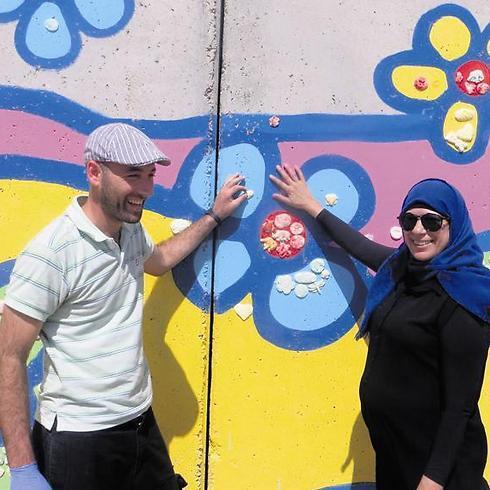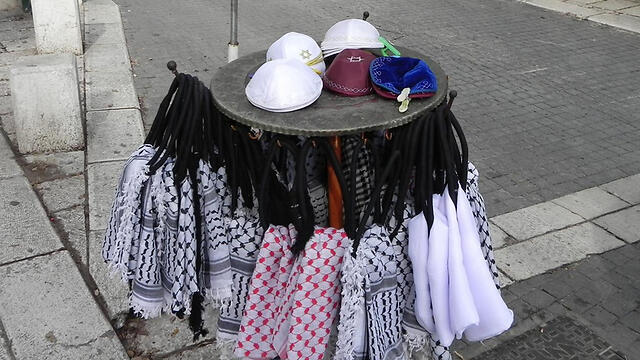Getting your Trinity Audio player ready...
There has been further deterioration in relations between Israel's Jewish and Arab citizens over the past two years, according to Index of Arab-Jewish Relations in Israel, complied annually by Haifa University for the past 41 years,
The index showed, for example, that more than half of Israeli Arabs did not accept Israel having a Jewish majority or recognized it as a Jewish and democratic state.
Among the Jewish public, meanwhile, a downturn was noted in willingness to live next to an Arab neighbor, to have children studying at school alongside Arab students, to enter Arab communities or to work under an Arab supervisor.
The research was overseen by Prof. Sammy Smooha, who said that despite worsening relations, Israelis were not yet at a breaking point. "Most Jews and most Arabs in Israel believe in a shared society. Opinion polls going back to 1976 point to the continued existence of a strong foundation for Jewish-Arab coexistence," he said.
The index's 2017 data showed a drop in the legitimacy of Jews and of the state in the eyes of Arabs and a simultaneous drop in legitimacy of Arab citizens in the eyes of Jews.
In 2015, for instance, 65.8% of Arabs recognized Israel's right to exist, compared to only 58.7% in 2017. In addition, recognizing Israel's legitimacy as a Jewish and democratic state dropped from 53.6% to 49.1% over the past two years, with recognition of the legitimacy of maintaining a Jewish majority dropping from 42.7% to 36.2%.
The sharpest drop, however, occurred in the rates of Arabs' acceptance of Israel's character. In 2015, 60.3% of Arabs accepted Israel having a Jewish majority, compared to 44.6% in 2017.
Consequently, two years ago 39% accepted Israel's Law of Return for Jews, compared to 25.2% today. Moreover, 56.2% concurred in 2015 with Israel's unique Hebrew-Israeli culture, compared to 45.6% in 2017. Similarly, only 46% of Israeli Arabs accepted Saturday as the country's day of rest, compared to 60.7% two years ago.
Having said that, 61.9% of Arabs in 2017 thought Israel was a good place to live, compared to 64% in 2015. A growth was also noted in the number of Arabs starting they prefer to live in Israel over anyplace else—60% in 2017 compared to 58.8% in 2015.
Another increase was shown in the number of Arabs stating they will not be willing to move to a Palestinian state, should one be created—77.4% in 2017 as opposed to 72.2% in 2015.
Examining the Jewish public, a similar downturn in the legitimacy of the Arab minority could be traced. The rate of Jews recognizing Arabs' right to live in Israel as a minority with complete civil rights dropped from 79.7% in 2015 to 73.8% in 2017.
Similarly, the rate of those assenting to Arabs holding full civil rights in a Jewish and democratic state dropped from 74.9% to 68.1%, with the rate of Jews accepting Arabs as full members of Israeli society dropping from 69.5% to 61.1%. Moreover, 28.9% of Jews were not willing to have Arab friends, compared to 24.3% in 2015.
The number of Jews supporting a Basic Law proposal enshrining Israel's status as the Nation-State of the Jewish People, meanwhile, held fast at 67.3%. A segmentation of the bill's supporters showed that an absolute majority of Jews in Israel—not including a small left-wing minority—"supported a new nationality law subjecting democracy to the country's Jewish character, thereby harming the standing of the Arab minority."
Despite the apparent downturn, data clearly showed the majority of Israel's Jewish public accepted Arabs as citizens with equal rights and an inseparable part of Israeli society. Prof. Smooha cited as proof the fact that 60.7% of Jews in 2017 concurred with the government's decision from late 2015 to undertake a massive five-year plan to develop the country's Arab sector at a cost of NIS 10-15 billion.
Nevertheless, comparing 2015's data with 2017 shows a decrease in willingness to a shared life. In 2015, 66% of Arabs agreed that "it's good for Jewish and Arab citizens to always live together in Israel" compared to 63.1% in 2017. A similar drop was noted among Jews, from 58.9% in 2015 to 52.4% in 2017.
A decrease could be gleaned from the report among Jews willing to have Arab students attend their children's schools—from 57.5% two years ago to 51.6% today—in addition to an increase in the number of Jews reporting aversion from entering Arab communities—59.3% to 63.7%. According to Smooha, the reason for the latter statistic was "a mixture of alienation, fear and boycotting."
Another rise was noted in the number of Jews uninterested in Arab neighbors—from 41% in 2015 to 48% in 2017. Jews objecting to having Arab supervisors at work have also proliferated, from merely 29% to 39.8%.
"Despite the worsening in the willingness to integrate, the data still showed immense openness—both by Arabs and by Jews—to maintain relations in the deeply split Israeli society," Prof. Smooha said.
The academic estimated that the reasons for said downturn could be traced to the current right-wing government's actions to curtail democracy, a popular intifada by Palestinian youngsters, the absence of peace negotiations between Israel and the Palestinians and a contemporary lack of awareness as to the state's investment in the Arab sector.
He continued, "Despite the deep-seated split between Jews and Arabs, the trend of Arab positions growing more extreme over the years and and Jewish positions doing the same recently, public opinions polls since 1976 show the continued existence of a strong foundation for Jewish-Arab coexistence in Israel.
"Most Arabs as well as most Jews believe in a shared society, accept the country within the boundaries of the Green Line as a framework for relations, feel Israel is a good place to live, are committed to democracy as the mechanism of regulating relations and agree that civil quality is the basis to coexistence and an important goal for the country.
"No side wants to walk away from the table. The Arab minority continues hitching its wagon to the State of Israel and is fighting to improve its standing therein. Israeli Arabs do not detach themselves from Israel or from its Jewish majority, nor do they prefer the Palestinian character over the Israeli one or are swept into massive clashes.
"Jews and the state, likewise, have no interest in fomenting crisis with the Arab minority and realize that it's different to the Palestinians under occupation, will only remain a part of Israel's populace and that there's no choice but to get along with it," Prof. Smooha concluded.
The Index of Arab-Jewish Relations in Israel public opinion polls have been conducted annually since 1976. The current survey, taken in May-August 2017, polled 700 Jews and 700 Arabs comprising a representative sample of each group's adult population.






